Wedged between beef noodle soup joints and cobwebbed Chinese medicine stores, we find organic kombucha vendors and surfers sipping coconut milk lattes. Weaving through alleyways of orange-roofed temples, I pass an elderly man downing Taiwan beers road side. Opposite, a backpacker beer garden hosts sunburned foreigners sampling locally brewed IPA.
The unusual juxtaposition reflects a decade-long change slowly crawling upon Waiao (外澳), a sleepy beach town in Yilan County. The locale is jostling between becoming the next surfers’ paradise and its traditional farming and fishing roots.
Hospitality is second nature here; my elderly taxi driver describes how the tight-knit rural community once operated roadside tea and bento box stalls, shouting to passing traffic, “have you eaten?” But about 13 years ago, he noted the change towards beach tourism — and surf.
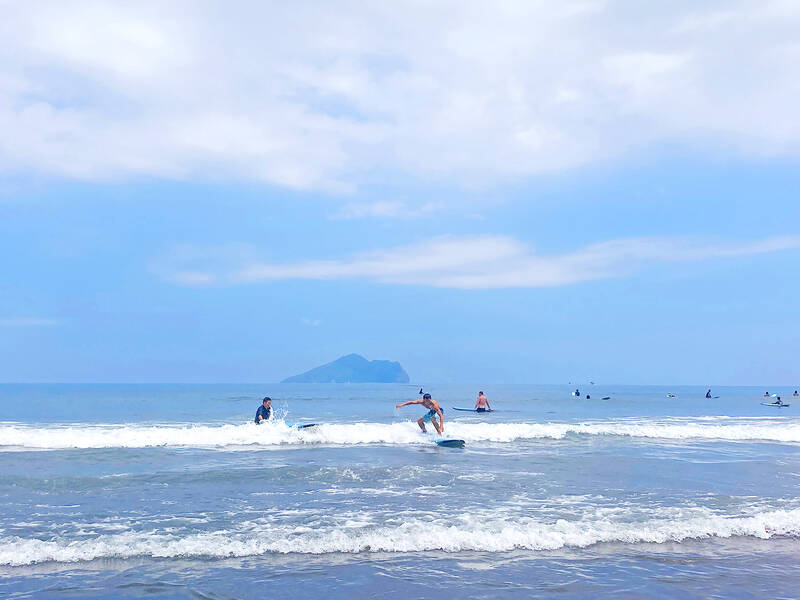
Photo: Hollie Younger
Just a two-hour local train ride from Taipei Main Station, the last decade has transformed Waiao into a cozy, indie refuge from the big city’s hustle and bustle. The station coffee shop, A Day at the Beach (海邊的一天), is run by two business partners with 9 to 5 jobs who escape Taipei every weekend for surf and sun.
As the live band closes down at the backpacker bar on Saturday night, a mass exodus leaves for the last train out of Waiao. Still initiating itself as an international tourist destination, the town comes alive on summer weekends with weary English teachers and laid-back surfers seeking reprise from the west-coast cities.
CHILL APPEAL
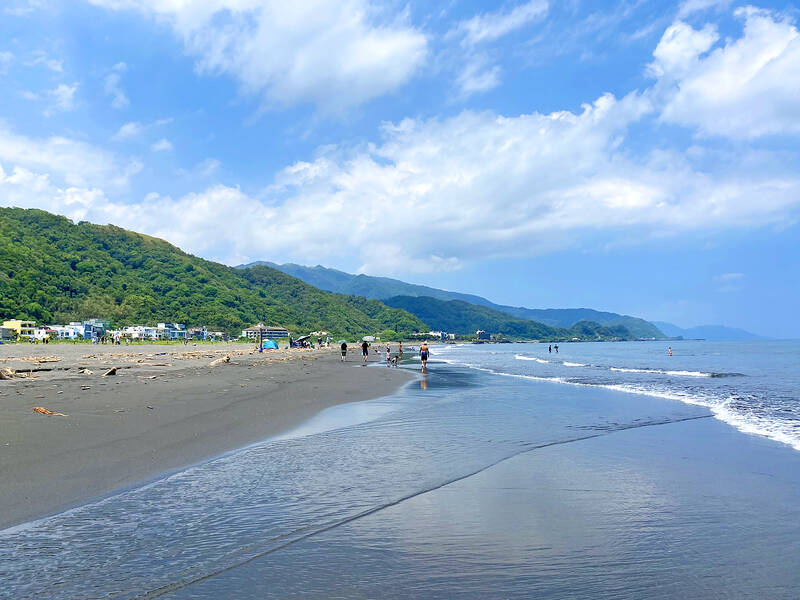
Photo: Hollie Younger
I see the appeal for the nomadic hippie. Waiao has a long, wide black-sand beach with gentle waves perfect for beginners’ surf lessons. The volcanic sand isn’t the gritty brown variety found in Kaohsiung, but charcoal blue-black, reflecting sunny skies onto crystal clear waters. Waiao gives the perfect vista of Turtle Island (龜山島), while the beach is streamlined by a verdant green mountain range with orange-umbrellaed paragliders swooping down to land on the sand.
Perfect for last-minute getaways, we find same-day accommodation for NT$1,600; trains don’t need reservations, the town isn’t crowded — but the bar is.
A 2015 Taipei Times travel story about Waiao described the town as “a small, tightly-knit expat surf community.” Garrett Ball then co-owned the Rising Sun Surf Inn and had just hosted Waiao’s first music festival.
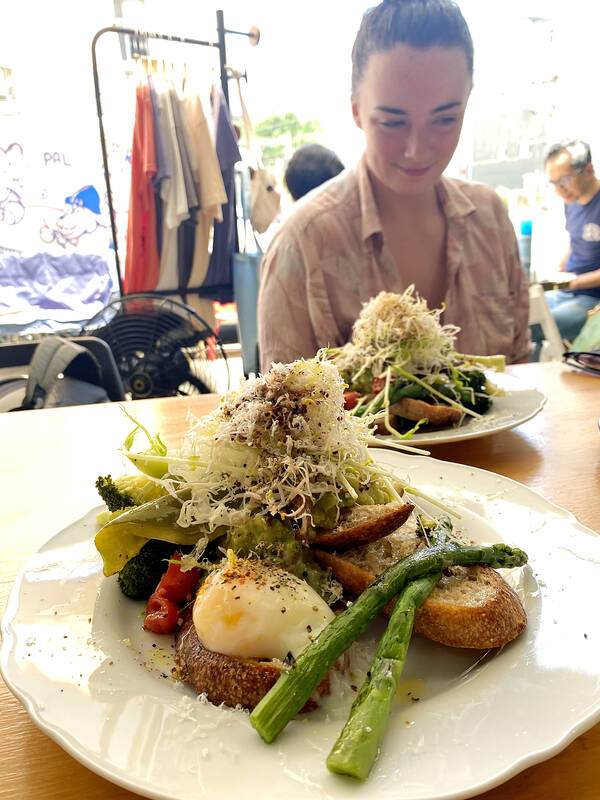
Photo: Hollie Younger
Nine years later, Ball co-owns Wai’ao Surf n’ Sport surf school and runs California Surf Waiao Beach Hostel (加州衝浪外澳旅店) and Drifters Pizza Pub (漂流者披薩吧), a mecca for beachgoers every Saturday night.
Offering live music, cocktails, IPAs and stone-baked pizzas, every table is full to watch a quirky ensemble whose original tunes and rock covers reflect their Taiwanese, American, Hong Kong and German backgrounds.
Ball, 41, hails from Ventura, California but has called Taiwan home for more than 13 years.
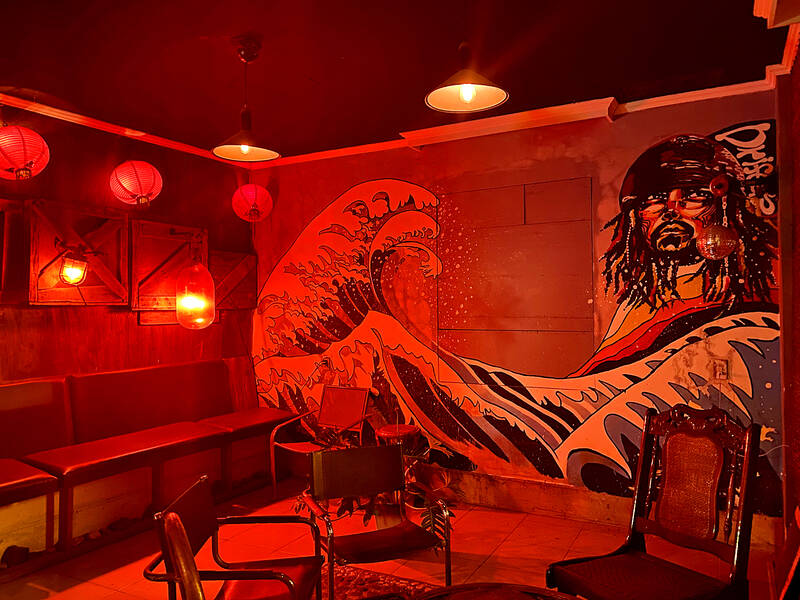
Photo: Hollie Younger
He was inspired by his uncle who spent his R&R from the Vietnam War in Formosa, returning to tell tales of cliff diving and motorbike tours along the wild coast. Ball himself traveled the world searching for the best waves: Costa Rica, Fiji, Mexico, but in 2010 he landed on Taiwan with the dream of opening a jungle beach hostel.
UNDETERMINED IDENTITY
I question if my flip-flops are entirely appropriate for a night on the town.
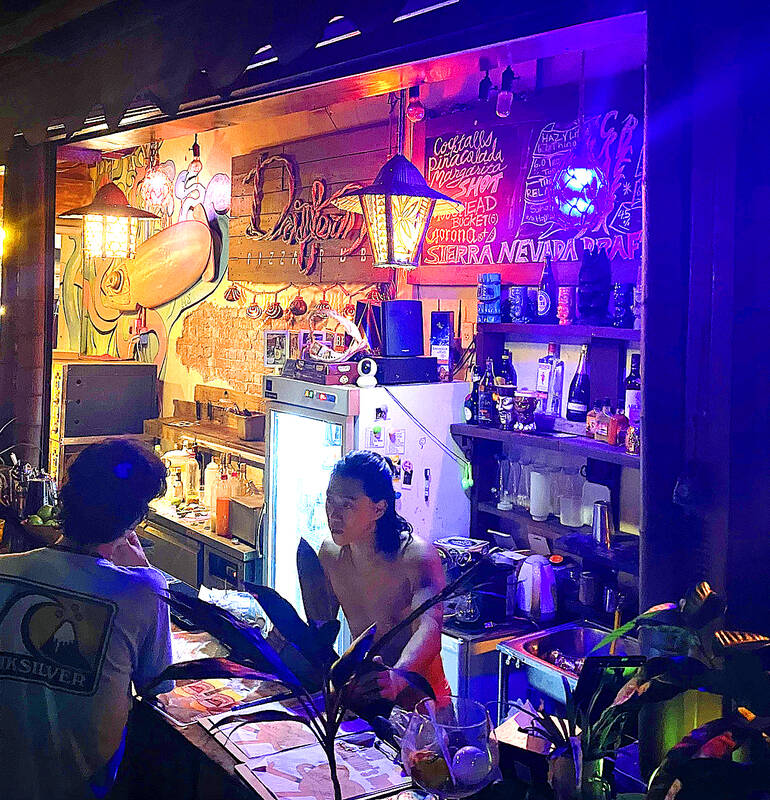
Photo: Hollie Younger
Stepping out into Drifters’ outdoor patio, I’m relieved to find staff and patrons in direct opposition to “no shirt no shoes no service.” We sip bottles of San Miguel, sample locally-made Yilan hot sauce and mingle with friendly, tanned regulars.
After crashing at Loft Ocean, a cozy boho hideaway in Toucheng Township (頭城) run by surfer Aga and her pup Xiao Bao, we started our day at Pal Coffee. Think classic bougie brunch fare — avocado toast on sourdough and iced lattes offered with four plant-based milks.
But down at Waiao Beach, the vibe shifted. We savored homemade taro sorbet from locals who, between grilling Taiwanese sausages, offered to stash our bags and treat jellyfish stings. The beach itself is a further testament to the town’s undetermined identity; Taiwanese families cover up with wetsuits and umbrellas to our left, while bikini-clad foreigners take a hostel surf lesson to our right.
Surf n’ Sport offers daily surf lessons right on Waiao Beach, from NT$2,000 for one-on-one classes to NT$6,000 for groups up to five, recommended to book 24 hours in advance. Boards can also be rented for NT$500 per day for advanced surfers — unlike myself. After several previous attempts landed flat on my face, I figured swimming was a safer bet, despite the rip currents, jellyfish and distinct lack of lifeguards on Waiao.
Ball says each year brings bigger crowds, and more Taiwanese, to his businesses. With Latin festivals and late-night parties, Drifters is cementing itself on the map. For now, the landscape alone is enough to sustain domestic tourism. But is Waiao destined to remain a quiet Taiwanese beach town or become Asia’s newest international backpacker surf destination? Perhaps the next nine years will tell.

This is the year that the demographic crisis will begin to impact people’s lives. This will create pressures on treatment and hiring of foreigners. Regardless of whatever technological breakthroughs happen, the real value will come from digesting and productively applying existing technologies in new and creative ways. INTRODUCING BASIC SERVICES BREAKDOWNS At some point soon, we will begin to witness a breakdown in basic services. Initially, it will be limited and sporadic, but the frequency and newsworthiness of the incidents will only continue to accelerate dramatically in the coming years. Here in central Taiwan, many basic services are severely understaffed, and

Jan. 5 to Jan. 11 Of the more than 3,000km of sugar railway that once criss-crossed central and southern Taiwan, just 16.1km remain in operation today. By the time Dafydd Fell began photographing the network in earnest in 1994, it was already well past its heyday. The system had been significantly cut back, leaving behind abandoned stations, rusting rolling stock and crumbling facilities. This reduction continued during the five years of his documentation, adding urgency to his task. As passenger services had already ceased by then, Fell had to wait for the sugarcane harvest season each year, which typically ran from

It is a soulful folk song, filled with feeling and history: A love-stricken young man tells God about his hopes and dreams of happiness. Generations of Uighurs, the Turkic ethnic minority in China’s Xinjiang region, have played it at parties and weddings. But today, if they download it, play it or share it online, they risk ending up in prison. Besh pede, a popular Uighur folk ballad, is among dozens of Uighur-language songs that have been deemed “problematic” by Xinjiang authorities, according to a recording of a meeting held by police and other local officials in the historic city of Kashgar in

It’s a good thing that 2025 is over. Yes, I fully expect we will look back on the year with nostalgia, once we have experienced this year and 2027. Traditionally at New Years much discourse is devoted to discussing what happened the previous year. Let’s have a look at what didn’t happen. Many bad things did not happen. The People’s Republic of China (PRC) did not attack Taiwan. We didn’t have a massive, destructive earthquake or drought. We didn’t have a major human pandemic. No widespread unemployment or other destructive social events. Nothing serious was done about Taiwan’s swelling birth rate catastrophe.